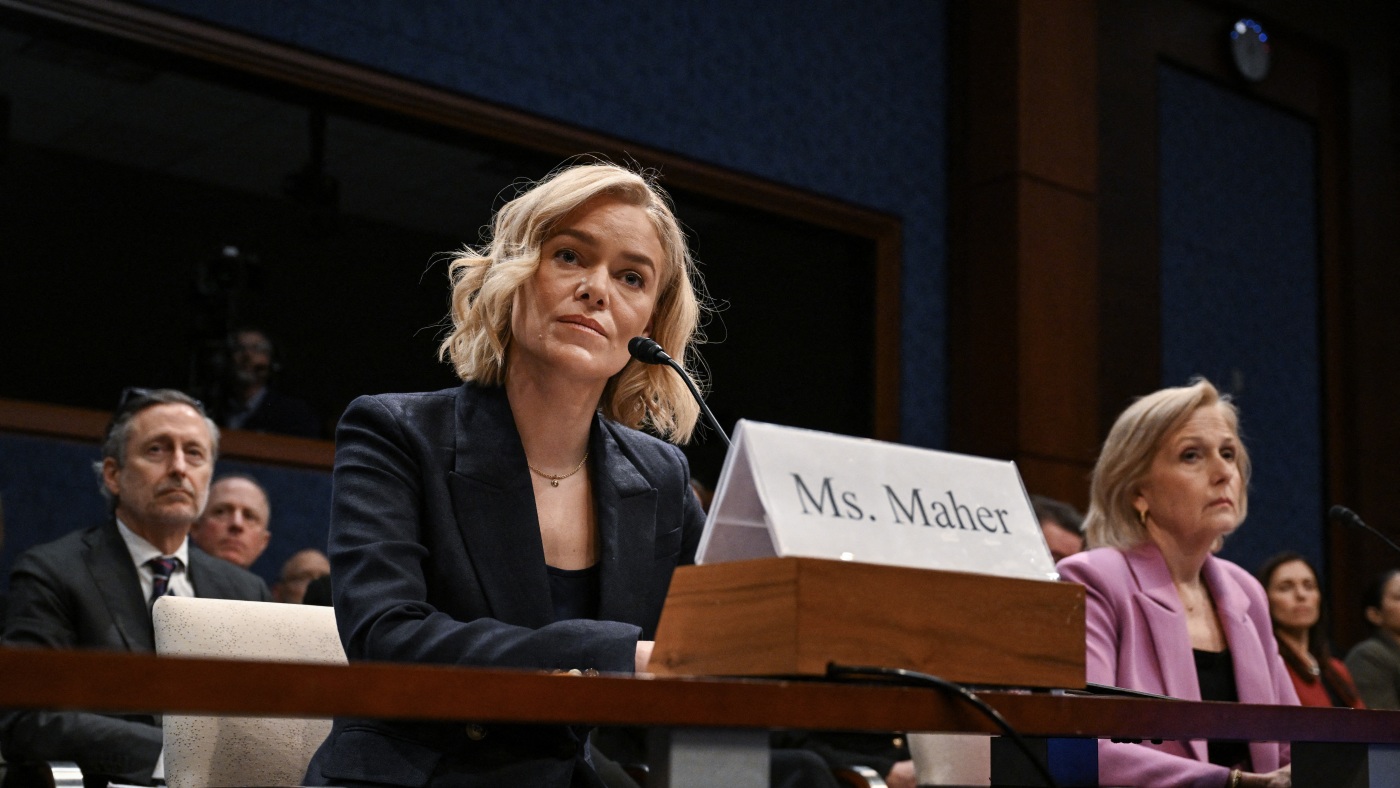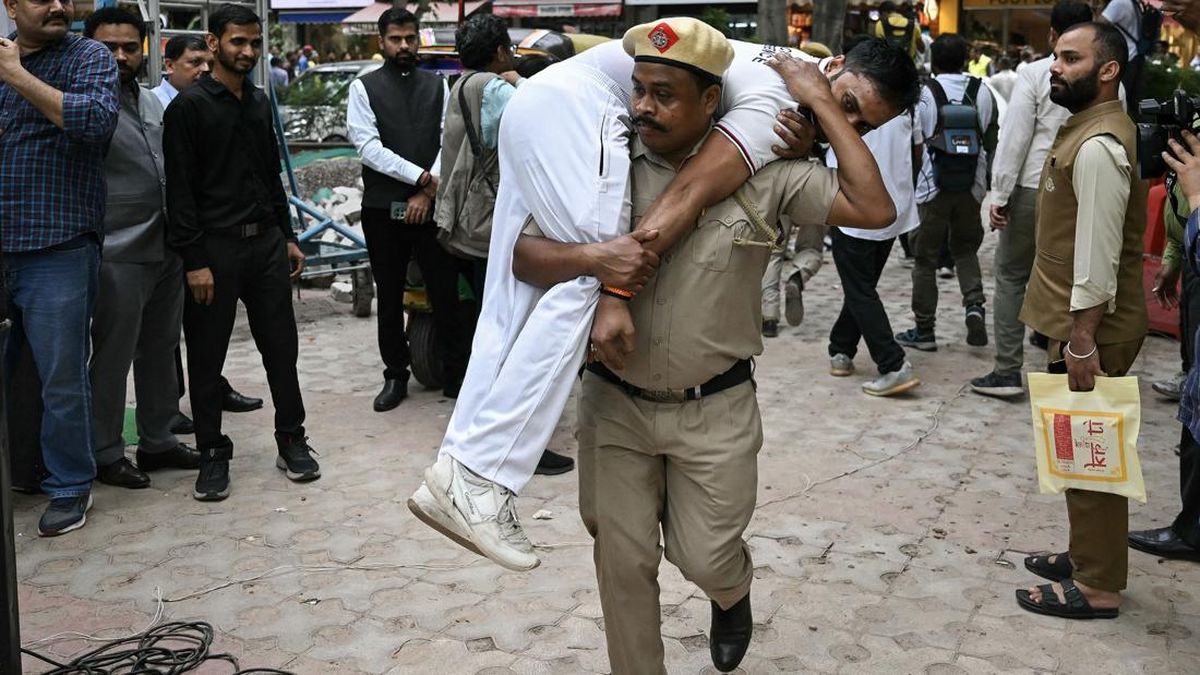
Spencer Hospital CEO Brenda Tiefenthaler (second from left) vows to maintain the facility's mental health services, with help from behavioral health services director Kerri Dandy (left), nursing director Jen Dau (third from left) and outreach navigator Jill Barr. Tony Leys/KFF Health News hide caption
toggle caption
Tony Leys/KFF Health News
SPENCER, Iowa — This town's hospital is a holdout on behalf of people going through mental health crises. The facility's leaders have pledged not to shutter their inpatient psychiatric unit, as dozens of other U.S. hospitals have.
Keeping that promise could soon get tougher if Congress slashes Medicaid funding. The joint federal-state health insurance covers an unusually large share of mental health patients, and hospital industry leaders say spending cuts could accelerate a decades-long wave of psychiatric unit closures.
At least eight other Iowa hospitals have stopped offering inpatient mental health care since 2007, forcing people in crisis to seek help at distant facilities. Spencer Hospital is one of the smallest in Iowa still offering the service.
CEO Brenda Tiefenthaler said 40% of her hospital's psychiatric inpatients are covered by Medicaid, compared with about 12% of all inpatients. An additional 10% of the hospital's psychiatric inpatients are uninsured. National experts say such disparities are common.
Tiefenthaler vows to keep her nonprofit hospital's 14-bed psychiatric unit open, even though it loses $2 million per year. That's a significant loss for an organization with an overall annual budget of about $120 million. But the people who use the psychiatric unit need medical care, "just like people who have chest pains," Tiefenthaler said.
Medicaid covers health care for about 72 million Americans with low incomes or disabilities. Tiefenthaler predicts that if some of them are kicked off the program and left without insurance coverage, more people will delay treatment for mental health problems until their lives spin out of control.
"Then they're going to enter through the emergency room when they're in a crisis," she said. "That's not really a solution to what we have going on in our country."
Republican congressional leaders have vowed to protect Medicaid for people who need it, but they also have called for billions of dollars in cuts to areas of the federal budget that include the program. President Trump has pledged to protect Medicaid while targeting "waste, fraud and abuse."
The U.S. already faces a deep shortage of inpatient mental health services, many of which were reduced or eliminated by private hospitals and public institutions, said Jennifer Snow, director of government relations and policy for the National Alliance on Mental Illness. At the same time, the number of people experiencing mental health problems has climbed.
"I don't even want to think about how much worse it could get," she said.
The American Hospital Association estimates that nearly 100 U.S. hospitals have shuttered their inpatient mental health services in the past decade.
Such closures are often attributed to mental health services being more likely to lose money than many other types of health care.
"I'm not blaming the hospitals," Snow said. "They need to keep their doors open."
Medicaid generally pays hospitals lower rates for services than they receive from private insurance or Medicare, the federal program that mostly covers people 65 or older. And Medicaid recipients are particularly likely to need mental health care. More than a third of nonelderly Medicaid enrollees have some sort of mental illness, according to a report from KFF, a nonprofit health policy organization that includes KFF Health News. Iowa has the highest rate of mental illness among nonelderly Medicaid recipients, at 51%.
As of February, just 20 of Iowa's 116 community hospitals had inpatient psychiatric units, according to a state registry. Iowa also has four freestanding mental hospitals, including two run by the state.
Iowa, with 3.2 million residents, has a total of about 760 inpatient mental health beds that are staffed to care for patients, the state reports. The Treatment Advocacy Center, a national group seeking improved mental health care, says that the "absolute minimum" of such beds would translate to about 960 for Iowa's population and that the optimal number would be about 1,920.
"They really shouldn't be in jail"
Most of Iowa's psychiatric beds are in metro areas, and it can take several days for a slot to come open. In the meantime, patients routinely wait in emergency departments.
Sheriff's deputies often are assigned to transport patients to available facilities when treatment is court ordered.
"It's not uncommon for us to drive five or six hours," said Clay County Sheriff Chris Raveling, whose northwestern Iowa county includes Spencer, a city of 11,000 people.
He said Spencer Hospital's mental health unit often is too full to accept new patients and, like many such facilities, it declines to take patients who are violent or charged with crimes.
The result is that people are held in jail on minor charges stemming from their mental illness or addictions, the sheriff said.
"They really shouldn't be in jail," he said. "Did they commit a crime? Yes. But I don't think they did it on purpose."
Raveling said authorities in many cases decide to hold people in jail so they don't hurt themselves or others while awaiting treatment. He has seen the problems worsen in his 25 years in law enforcement.
Most people with mental health issues can be treated as outpatients, but many of those services also depend heavily on Medicaid and could be vulnerable to budget cuts.
Jon Ulven, a psychologist who practices in Moorhead, Minn., and neighboring Fargo, N.D., said he's particularly worried about patients who develop psychosis, which often begins in the teenage years or early adulthood. If they're started right away on medication and therapy, "we can have a dramatic influence on that person for the rest of their life," he said. But if treatment is delayed, their symptoms often become harder to reverse.
Ulven, who helps oversee mental health services in his region for the multistate Sanford Health system, said he's also concerned about people with other mental health challenges, including depression. He noted a study published in 2022 that showed suicide rates rose faster in states that declined to expand their Medicaid programs than in states that agreed to expand their programs to cover more low-income adults. If Medicaid rolls are reduced again, he said, more people would be uninsured and fewer services would be available. That could lead to more suicides.
Nationally, Medicaid covered nearly 41% of psychiatric inpatients cared for in 2024 by a sample of 680 hospitals, according to an analysis done for KFF Health News by the financial consulting company Strata. In contrast, just 13% of inpatients in those hospitals' cancer programs and 9% of inpatients in their cardiac programs were covered by Medicaid.
If Medicaid participants have mental crises after losing their coverage, hospitals or clinics would have to treat many of them for little or no payment.
"These are not wealthy people. They don't have a lot of assets," said Steve Wasson, Strata's chief data and intelligence officer. Even though Medicaid pays hospitals relatively low rates, he said, "it's better than nothing."
Birthing units, which also have been plagued by closures, face similar challenges. In the Strata sample, 37% of those units' patients were on Medicaid in 2024.
Spencer Hospital, which has a total of 63 inpatient beds, has maintained both its birthing unit and its psychiatric unit, and its leaders plan to keep them open. Amid a critical shortage of mental health professionals, it employs two psychiatric nurse practitioners and two psychiatrists, including one providing care via video from North Carolina.
Local resident David Jacobsen appreciates the hospital's efforts to preserve services. His son Alex was assisted by the facility's mental health professionals during years of struggles before he died by suicide in 2020.
David Jacobsen knows how reliant such services are on Medicaid, and he worries that more hospitals will curtail mental health offerings if national leaders cut the program. "They're hurting the people who need help the most," he said.
People on Medicaid aren't the only ones affected when hospitals reduce services or close treatment units. Everyone in the community loses access to care.
Alex Jacobsen's family saw how common the need is. "If we can learn anything from my Alex," one of his sisters wrote in his obituary, "it's that mental illness is real, it doesn't discriminate, and it takes some of the best people down in [its] ugly swirling drain."
KFF Health News is a national newsroom that produces in-depth journalism about health issues and is one of the core operating programs at KFF — the independent source for health policy research, polling, and journalism.

 2 months ago
31
2 months ago
31

















































